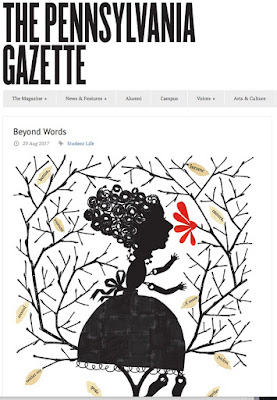We could not take photographs until after the show. We simply had to take it in, to be there for it, in the present now.
It was the Pan-Asian Dance Troupe's presentation of "Spirit: The Four Elements." It was Christine Wu, my former student, who had once written, memoiristically, of choreography and dance, and who now stood as troupe president on that stage in all her gorgeous tendernessfiercenessjoyfulnesstalent. In a show that was surprisingly wide-ranging, elevated, clever, classic, and contemporary, Christine and more than two dozen others gave us the world according to movement.
They drove a raucous audience toward congratulatory crazy.
There was "Ti Cao! Morning Exercise," inspired, as the program tells us, "by the early morning fitness routines of Chinese school children." There was the wildly inventive and rhythmic "What Does the Nut Say?," a piece featuring "nuts, coconut bras,
and half-naked dudes." There was "Road to a Geisha," which began with the flicker of
paper umbrellas and ended with loose hair and Korean hip-hop. There was a stunning water dance that quieted the crowd—water in cups on heads, in cups in hands, in transporting stillness. Big sticks, flashing swords, old-world costumes, long sleeves, diaphanous flags. One striking image, one imaginative dance—and then another and another.
In between
these and so many other pieces were glorious film fragments—the big steaming
earth, in some footage, flickers of the dancers themselves in the rain, on a bridge, near a pond, by the big doors, even at the ice rink of the Penn campus, in others. There the dancers were, doing martial art. There they were stomping on puddles. There they were doing wickedly fast scratch spins.There they were—costumed and smiling.
To my right, in the pews of Iron Gate Theater, sat the ever-gorgeous Chang, also a former student—an intensely intelligent straight A (so far, she says) engineering student, who once brought me hot chocolate, drew me pictures, and this week remembered my birthday with a gift. To my left sat poet-bio-engineer-er Eric, whose gentle nature belies the brilliance of his academic career. Elsewhere in the pews sat our beautiful, talented, headed-for-a big-writing career Angela. We were there for Christine, we were there for the troupe, we came to see, and oh did we ever.
Christine, the intelligence and quality of your show was not unexpected, coming from you and your troupe, but it was so fully rewarding. Chang, Eric, Angela—thank you for being you. And Katie Goldrath, my Katie of an earlier year, my Katie of the
Pennsylvania Gazette story—how wonderful it was to walk with you through the Penn campus and up to Manakeesh, before the show. You are going to make such a huge difference in the lives of others when you graduate with your medical degree. Indeed, you already are.
Read more...
































